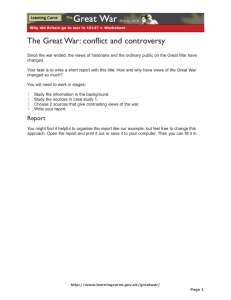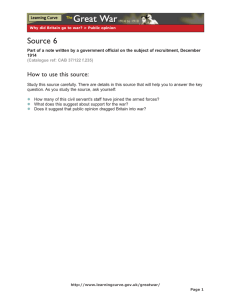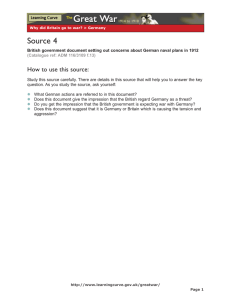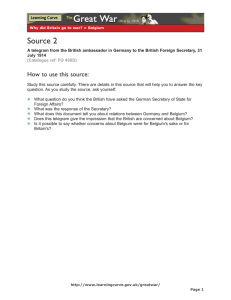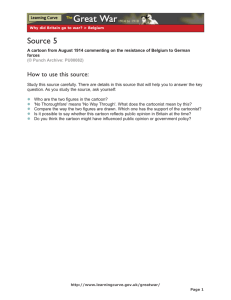Did Britain go to war over Belgium?
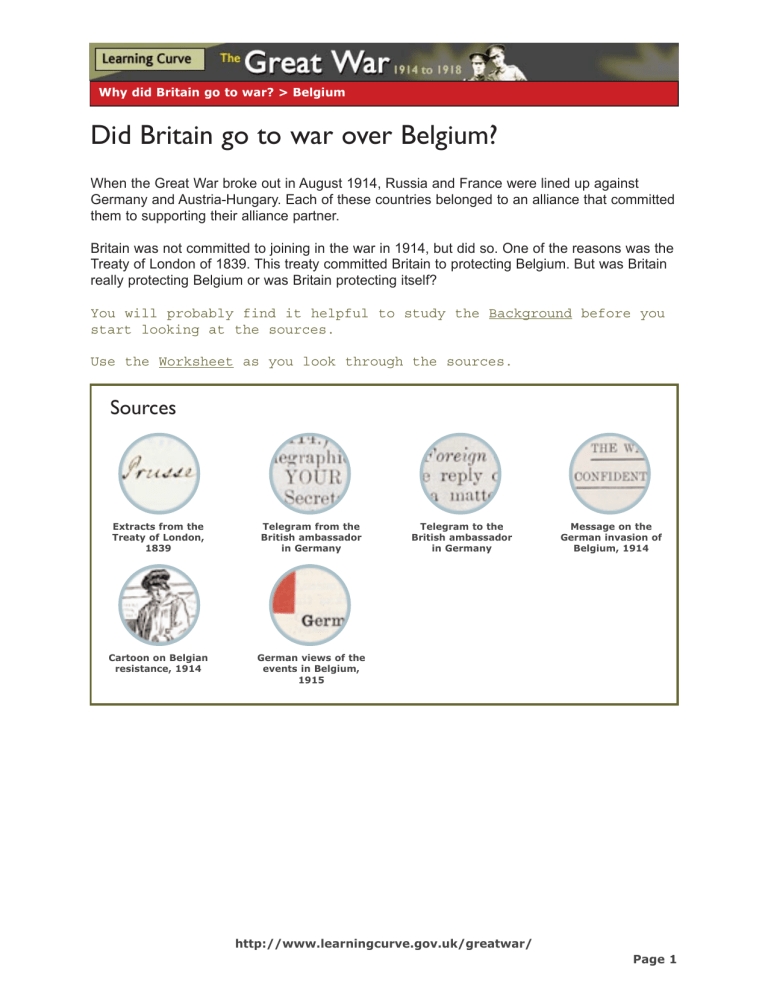
Why did Britain go to war? > Belgium
Did Britain go to war over Belgium?
When the Great War broke out in August 1914, Russia and France were lined up against
Germany and Austria-Hungary. Each of these countries belonged to an alliance that committed them to supporting their alliance partner.
Britain was not committed to joining in the war in 1914, but did so. One of the reasons was the
Treaty of London of 1839. This treaty committed Britain to protecting Belgium. But was Britain really protecting Belgium or was Britain protecting itself?
You will probably find it helpful to study the Background before you start looking at the sources.
Use the Worksheet as you look through the sources.
Sources
Extracts from the
Treaty of London,
1839
Telegram from the
British ambassador in Germany
Telegram to the
British ambassador in Germany
Message on the
German invasion of
Belgium, 1914
Cartoon on Belgian resistance, 1914
German views of the events in Belgium,
1915 http://www.learningcurve.gov.uk/greatwar/
Page 1
Why did Britain go to war? > Belgium
Source 1
Extracts from the Treaty of London, 1839
(Catalogue ref: FO 93/14/4)
1a 1b 1c
How to use this source:
Study this source carefully. There are details in this source that will help you to answer the key question. As you study the source, ask yourself: z Which countries have signed and agreed the treaty?
z Why were France and Germany interested in Belgium?
z Why did Britain see Belgian neutrality as an advantage?
z Why would Russia and Austria-Hungary be interested in Belgium?
http://www.learningcurve.gov.uk/greatwar/
Page 2
Why did Britain go to war? > Belgium
Source 1a
http://www.learningcurve.gov.uk/greatwar/
Page 3
Why did Britain go to war? > Belgium
Source 1b
http://www.learningcurve.gov.uk/greatwar/
Page 4
Why did Britain go to war? > Belgium
Source 1c
http://www.learningcurve.gov.uk/greatwar/
Page 5
Why did Britain go to war? > Belgium
Source 2
A telegram from the British ambassador in Germany to the British Foreign Secretary, 31
July 1914
(Catalogue ref: FO 438/2)
How to use this source:
Study this source carefully. There are details in this source that will help you to answer the key question. As you study the source, ask yourself: z What question do you think the British have asked the German Secretary of State for
Foreign Affairs?
z What was the response of the Secretary?
z What does this document tell you about relations between Germany and Belgium?
z Does this telegram give the impression that the British are concerned about Belgium?
z Is it possible to say whether concerns about Belgium were for Belgium's sake or for
Britain's?
http://www.learningcurve.gov.uk/greatwar/
Page 6
Why did Britain go to war? > Belgium
Source 2
http://www.learningcurve.gov.uk/greatwar/
Page 7
Why did Britain go to war? > Belgium
Source 3
A telegram from the British Foreign Secretary to the British ambassador in Germany, 1
August 1914
(Catalogue ref: FO 438/2)
How to use this source:
Study this source carefully. There are details in this source that will help you to answer the key question. As you study the source, ask yourself: z Why was the Foreign Secretary unhappy?
z According to the telegram, how did people in Britain feel about Belgium?
z Is it possible to tell from this source why people felt this way?
z What did the Germans want from the British?
z How did the British respond?
z According to the telegram, how important was public opinion in Britain? http://www.learningcurve.gov.uk/greatwar/
Page 8
Why did Britain go to war? > Belgium
Source 3
http://www.learningcurve.gov.uk/greatwar/
Page 9
Why did Britain go to war? > Belgium
Source 4
Message from the German ambassador in Britain to the British government on the
German invasion of Belgium in August 1914
(Catalogue ref: FO 371/2161)
How to use this source:
Study this source carefully. There are details in this source that will help you to answer the key question. As you study the source, ask yourself: z What is Germany promising to Britain?
z How does the German ambassador try to convince Britain that his assurances can be believed?
z According to the message, why have the Germans invaded Belgium?
z According to the message, was the German information about the French plans reliable?
z Does this source give any clues about how the Germans thought the British would react to the invasion of Belgium?
http://www.learningcurve.gov.uk/greatwar/
Page 10
Why did Britain go to war? > Belgium
Source 4
http://www.learningcurve.gov.uk/greatwar/
Page 11
Why did Britain go to war? > Belgium
Source 5
A cartoon from August 1914 commenting on the resistance of Belgium to German forces
(© Punch Archive: PU00082)
How to use this source:
Study this source carefully. There are details in this source that will help you to answer the key question. As you study the source, ask yourself: z Who are the two figures in the cartoon? z 'No Thoroughfare' means 'No Way Through'. What does the cartoonist mean by this?
z Compare the way the two figures are drawn. Which one has the support of the cartoonist?
z Is it possible to say whether this cartoon reflects public opinion in Britain at the time?
z Do you think the cartoon might have influenced public opinion or government policy?
http://www.learningcurve.gov.uk/greatwar/
Page 12
Why did Britain go to war? > Belgium
Source 5
http://www.learningcurve.gov.uk/greatwar/
Page 13
Why did Britain go to war? > Belgium
Source 6
German views on the events of 1914 concerning Belgium, reported in 1915
(Catalogue ref: FO 881/10520)
6a 6b
How to use this source:
Study this source carefully. There are details in this source that will help you to answer the key question. As you study the source, ask yourself: z Who first used the phrase 'Scrap of Paper'?
z According to the Chancellor, how was the phrase misunderstood?
z Why did this misunderstanding happen?
z According to this document, what forced Germany to march through Belgium? z What accusations does the German Chancellor make about Britain and Belgium?
z According to this document, was Britain concerned about the best interests of Belgium?
http://www.learningcurve.gov.uk/greatwar/
Page 14
Why did Britain go to war? > Belgium
Source 6a
http://www.learningcurve.gov.uk/greatwar/
Page 15
Why did Britain go to war? > Belgium
Source 6b
http://www.learningcurve.gov.uk/greatwar/
Page 16
